

You Are a Revolutionary: A Letter to Working-Class Creatives

To my comrades in the arts,
I write to you today, hopeful that I can answer one of the most important questions of our time.
This question sits at the back of my mind, and no doubt, most likely yours. It festers and manifests into either hope or defeat.
It inspires many, but it also leaves us with feelings of conflict. This, combined with the constant attacks from those in power and those who have been brainwashed to believe they will someday join their oppressors on that blood-soaked throne, can even make us feel unworthy and like impostors to the cause.
The question I’m here to ask today, to you, myself, and our allies across the nation and around the world, is this: How, without taking up arms, can I truly call myself a revolutionary?
We watch as the vampiric class takes our pleas for a better society as at best a tantrum, and at worst, an attack on their so-called “free world.”
We watch as the left hand of the establishment monster pats us on the head and sends us on our way, then reaches over to the right to collect its share of the wealth and power. All the while, that same right hand just moments before, with a clenched fist, slammed down and snuffed out the cries of the working class.
It’s by acknowledging that these are the likely outcomes that many of us may be too afraid to march or speak out, with the fear that you can just be abducted, sent to a place you may not even know, or risk losing what little stability you have in an already broken, unjust, and unstable system.
And all this, again, begs the question: How, without risking what little I have, can I truly be a revolutionary?
And throughout countless hours of reflection, sleepless nights, and a painful analysis of the hate rampant on social media, it’s that I’ve recognized what can be one of the most revolutionary acts of our modern times.
And that, my friends, is to create.
For too long, they have told us that our lives as creatives are meaningless. That our pursuit of the arts and knowledge about everything that makes us human is not worth it because it is not profitable.
That to live a fulfilling life, you need to give yourself to a system that does as little as possible to ensure your wellbeing in the name of profit.
Sacrifice what little time you have to pursue your passions to make even more money, and to leave little energy in your reserve so as not to question or step out of line.
To that I say, be relentless in your rebellion.
And by that I mean we must execute the perversion that is this self-hatred and submission to capitalist degradation.
Creativity feeds the human spirit, consequently fueling the desire to learn, and as we’ve seen, education is what tyrants fear most.
Because it’s through education that we can make vital steps toward achieving solidarity and collective class consciousness.
So take everything going on around you
And write a poem,
Draw a picture,
Make a song,
Pen an essay,
Record a video,
Use the arts to fuel the revolution. To create the blueprint for a world that values people over profits.
And if you say to yourself you’re not an artist, I challenge you to prove yourself wrong.
And when you do, you will realize that you are a revolutionary.
The post You Are a Revolutionary: A Letter to Working-Class Creatives first appeared on Salt Lake DSA.


The unfulfilled aspiration of America


The future of EWOC is bright


Opinion: Germany Must Act to Prevent Genocide


Fight for the National Association of Letter Carriers (USPS)


DSA Convention 2025


The Vermont Socialist - GMDSA newsletter (8/30/25): Storm the fort

Kids in Vermont have gone back to school. On their first day after the summer vacation, Windham County students may have expected to say hello again to their usual bus drivers, but that'll have to wait. Travel Kuz, the supervisory union's transportation contractor, has locked out members of Teamsters Local 597 and brought in scabs.
Bus drivers and monitors responded to their bosses' refusal to bargain by organizing pickets. On Wednesday, Travel Kuz sent them a cease-and-desist letter, calling a demonstration at Brattleboro Union High School "unlawful" and "unsafe." Local law enforcement disagreed.
The Teamsters want Windham Southeast superintendent Mark Speno to pressure Travel Kuz to end the lockout and have encouraged allies to contact him. Tell Speno (802-254-3730, mspeno@wsesdvt.org) to support the transportation workers' fight for fair wages and benefits. You can even attend the next school board meeting.
Follow Local 597's Facebook page for the latest updates. An injury to one is an injury to all.
And speaking of the Teamsters, you may see some of them in Burlington at the Labor Day Solidarity March, Rally & Picnic. Dozens of unions and activist organizations (including Green Mountain DSA) have endorsed the event.
You can help us get ready by joining us at Migrant Justice (179 S. Winooski Ave., Burlington) today (8/30) at 4 p.m. to create art for the rally. Feel free to bring materials.
We expect a massive turnout for the rally itself. Meet us at Battery Park at 1 p.m. on Monday, Sept 1. Labor Day belongs to workers.
Unfortunately, as the schoolkids already know, Labor Day also means that summer is over. Thanks for the memories – here are a few shots from our chapter's barbecue at Oakledge Park.
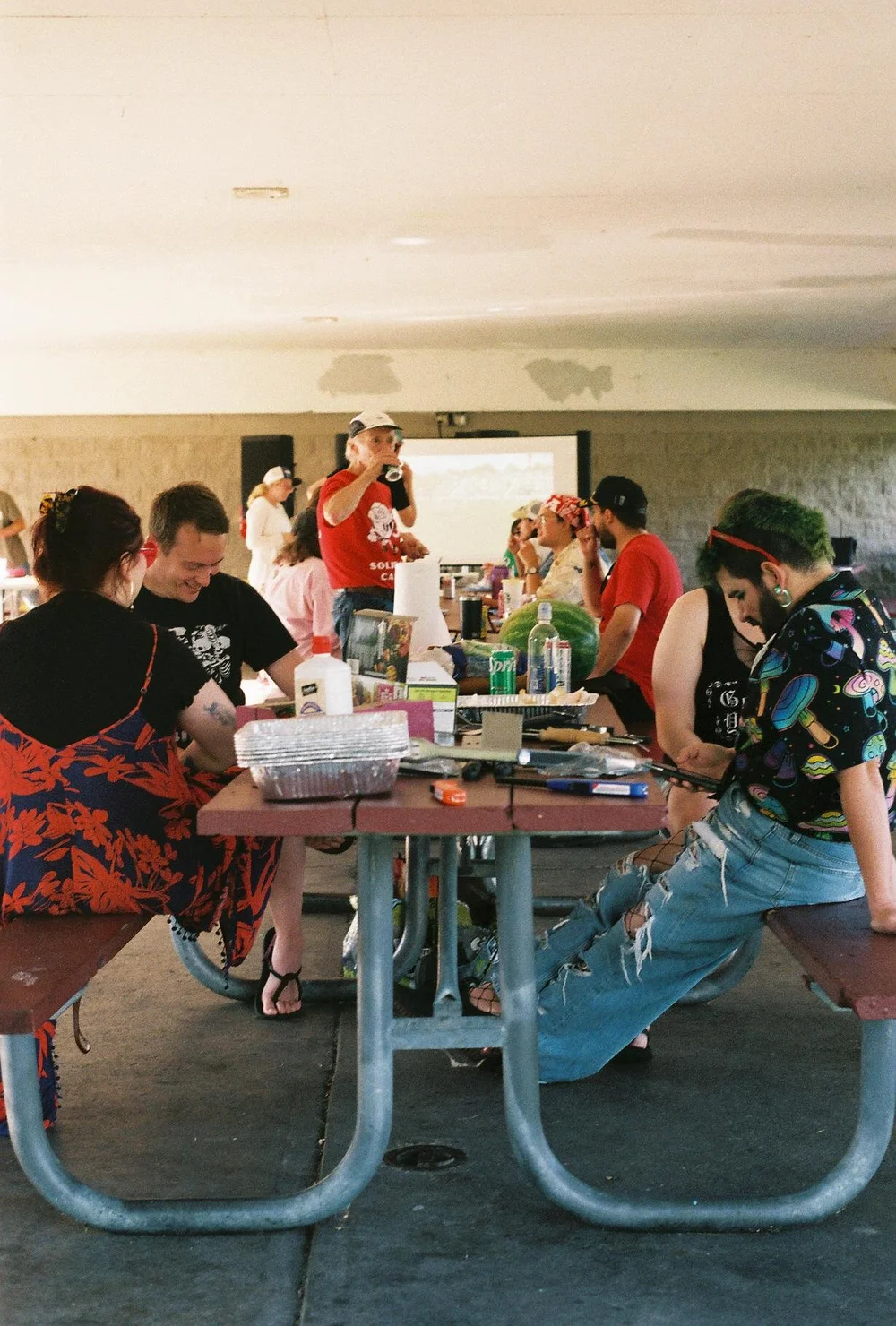
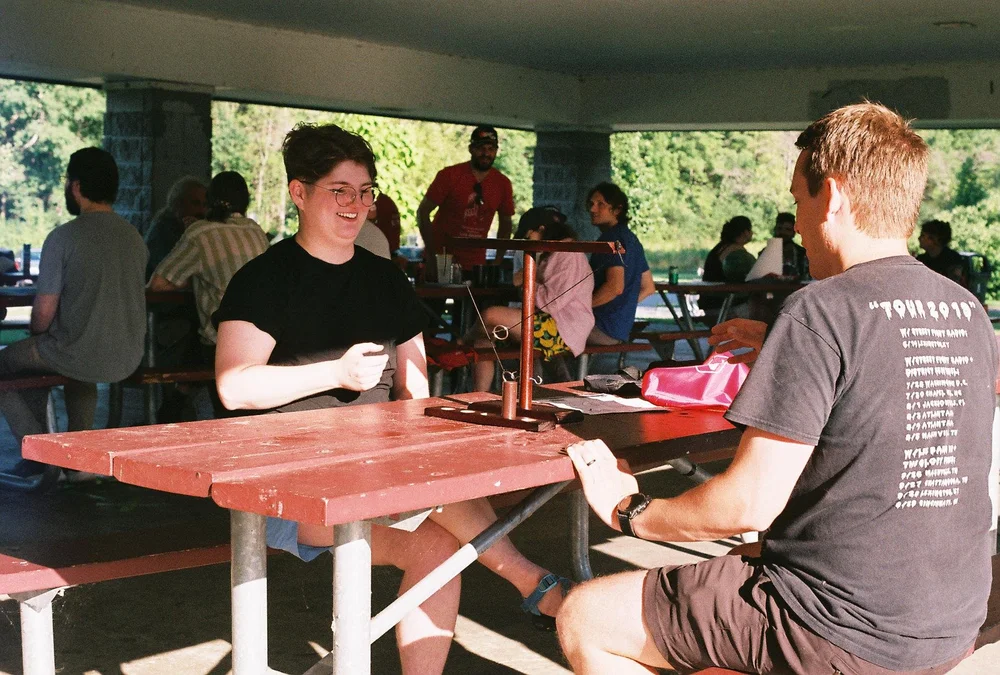


GMDSA MEETINGS & EVENTS
🚲 In order to avoid a conflict with the Labor Day rally, GMDSA's Urbanism Committee will meet on Tuesday, Sept. 2, at 6 p.m. on Zoom.
👋 Find out how you can help our Membership Committee improve recruitment and involvement in our chapter on Thursday, Sept. 4, and Tuesday, Sept. 23, at 6 p.m. on Zoom.
🧑🏭 Our Labor Committee will hold its next meeting on Monday, Sept. 8, at 6 p.m. on Zoom.
🔨 Talk about your job and learn about shop-floor organizing from peers at Workers' Circle (co-hosted by the Green Mountain IWW) on the second and fourth Wednesdays of each month, including Sept. 10, at 6 p.m. at Migrant Justice (179 S. Winooski Ave., Burlington).
🍿 Socialist Film Club will host another backyard screening in Burlington on Friday, Sept. 12, at 7 p.m. Please email us for more information if you're interested.
🗳️ The next meeting of our Electoral Committee will take place on Wednesday, Sept. 17, at 6 p.m. on Zoom.
🤝 GMDSA's East Branch and West Branch will come together for a general meeting on Saturday, Sept. 20, at 11 a.m. at Montpelier's Christ Episcopal Church (64 State St.), with an optional orientation for newcomers at 10 a.m.
🍉 Our Palestine Solidarity Committee will meet on Monday, Sept. 29, at 7 p.m. on Zoom.
STATE & LOCAL NEWS
📰 GMDSA-endorsed state senator Tanya Vyhovsky (Chittenden-Central) toured Ukraine, meeting with activists, politicians, students, and trade unionists.
📰 Protesting the Trump administration, Vermonters and Quebecois gathered at the US-Canada line in an expression of international solidarity.
COMMUNITY FLYERS
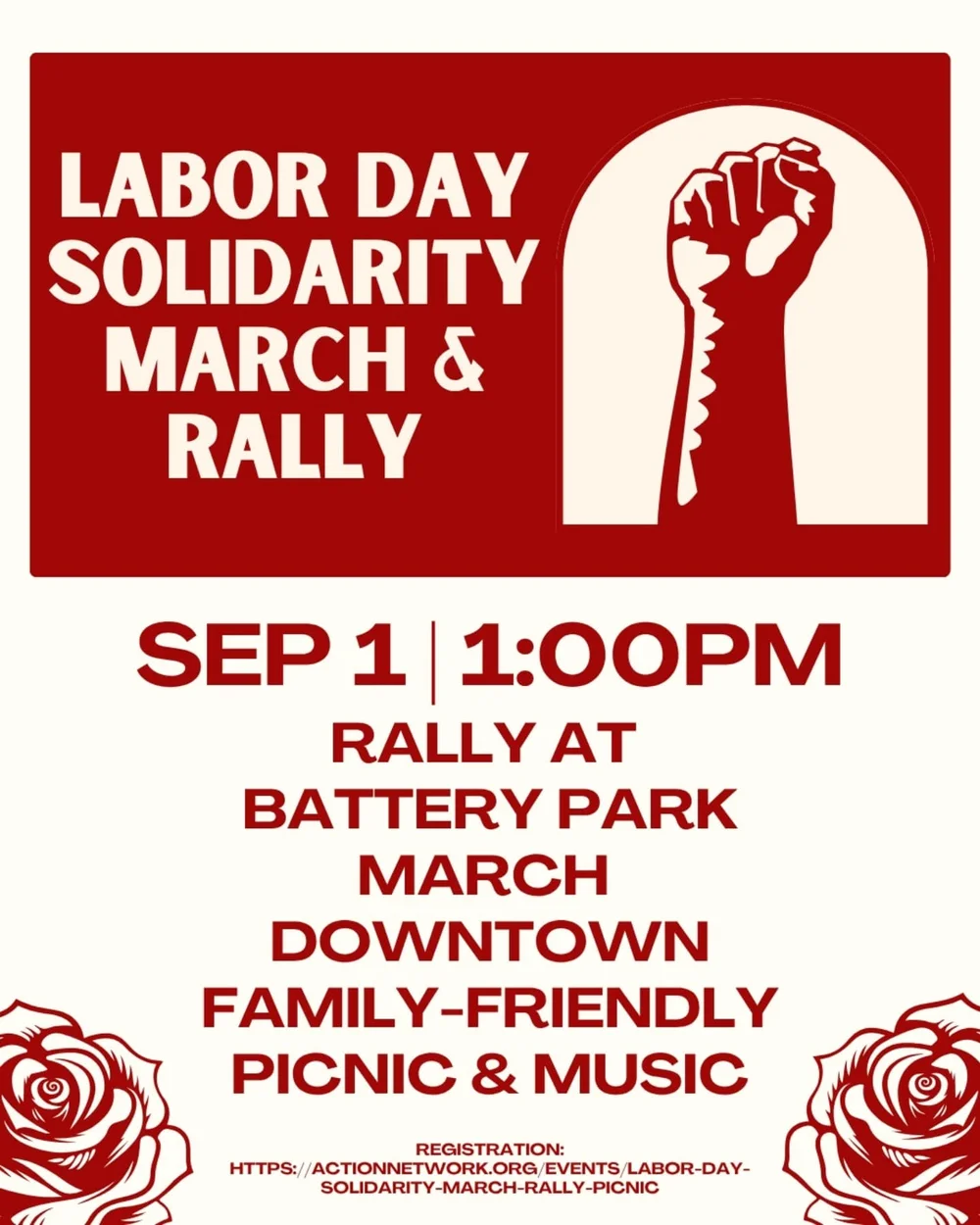
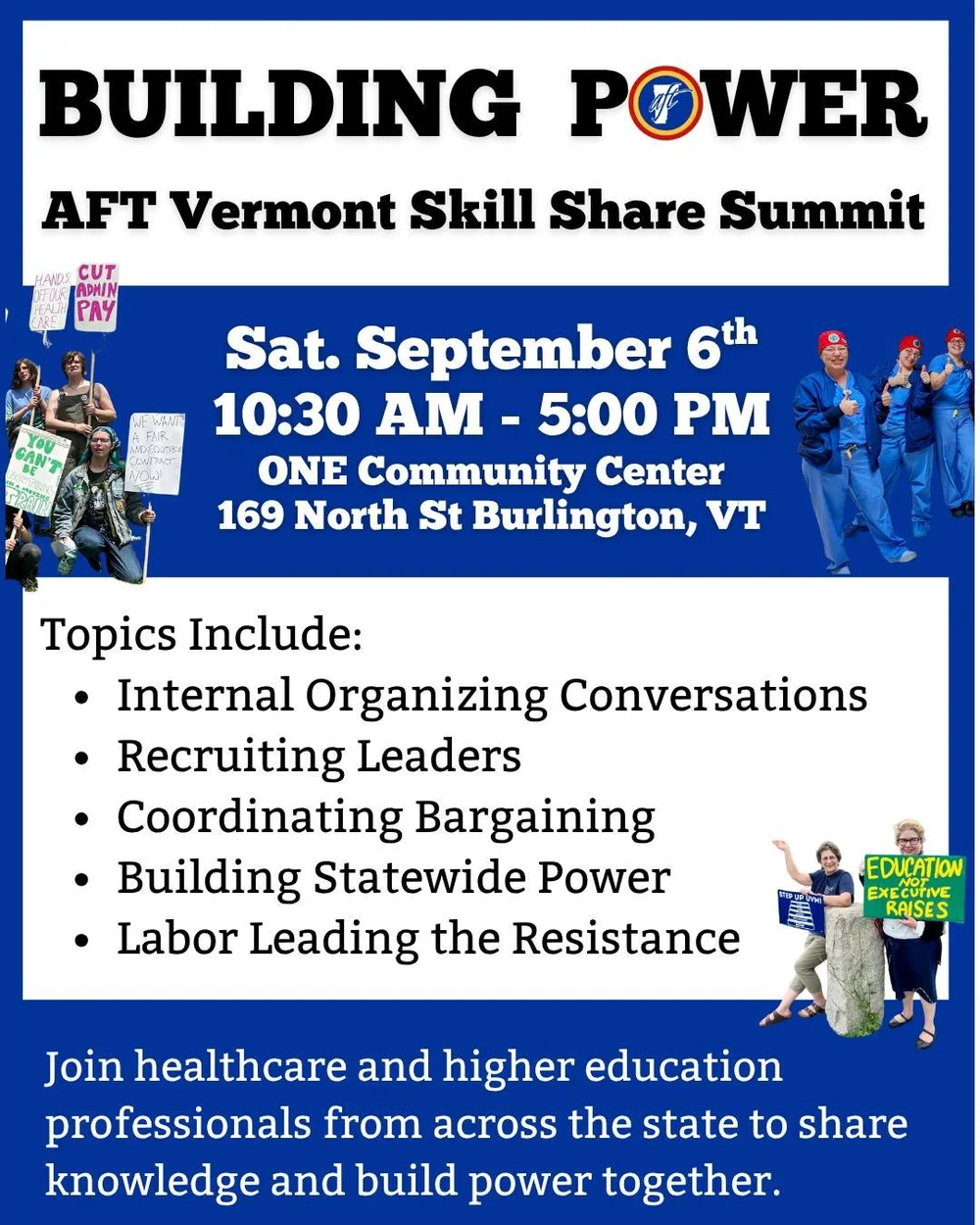

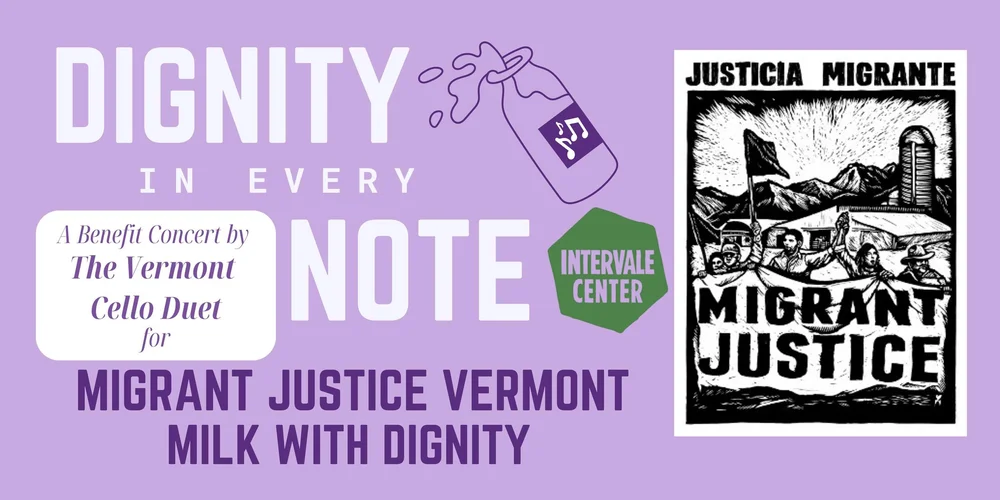


DSA IC Condemns US-brokered “peace” eroding Armenia’s sovereignty and rewarding Azerbaijan’s genocide in Artsakh
The Democratic Socialists of America International Committee (DSA IC) unequivocally condemns the “peace” plan brokered by President Donald Trump between Armenia and Azerbaijan. We call on the United States to immediately reverse course and ensure that any peace agreement is finalized with full consequences for Azerbaijan’s officials for perpetrating a genocide against the indigenous Armenians of Artsakh (also known as Nagorno-Karabakh). This means ensuring the right of return for Artsakh Armenians, recognition of their right to self-determination, and prosecution for crimes against humanity by Azerbaijan’s ethno-supremacist government under Ilham Aliyev.
Nearly two years ago, Azerbaijan finalized a brutal assault on the de facto autonomous region of Artsakh, besieging, starving, and ultimately expelling the native Armenian population. As the world first saw in 2020, this assault was made possible by U.S. complicity in the actions of two of its allies, Turkey and Israel. Despite State Department Acting Assistant Secretary Yuri Kim assuring the world that “the United States will not countenance any action or effort—short-term or long-term—to ethnically cleanse or commit other atrocities against the Armenian population of Nagorno-Karabakh,” the United States did exactly that.
Despite Azerbaijan’s documented and numerous crimes against humanity, its occupation of sovereign Armenian territory, and its genocide of Artsakh’s Armenian population, administrations of both major parties have now acquiesced to this regime’s demands. This includes repeatedly waving Section 907 of the Freedom Support Act to send American tax dollars to arm the Azerbaijani military. The shameful situation can be explained by the geopolitics of the South Caucasus.
Turkey, for its part, continues to engage in vehement denial of the 1915 Armenian Genocide and uses fascistic, hyper-nationalist rhetoric both at home and in its foreign policy. Towards Azerbaijan, this means advancing Pan-Turkism, which largely scapegoats Armenians as an inferior and sub-human people worthy of extermination in order to create a contiguous Turkic nation. Both Turkish President Reccep Erdogan and Azerbaijani President Aliyev have, for instance, publicly praised the actions of the perpetrators of the 1915 Armenian Genocide and their immediate underlings repeatedly advance the idea of “completing” the task. However, support for Azerbaijan from U.S. allies neither starts nor ends with Turkey.
Israel, since the fall of the Soviet Union, has cultivated a deep relationship with Azerbaijan. Reports suggest that Azerbaijan continues to be one of the top three energy suppliers of Israel. In exchange, Israel sells weapons to and tests developing systems in partnership with Azerbaijan’s military. In fact, around 70 percent of Azerbaijan’s weapons are reported to come from Israel. In 2020, Israeli drones were a key factor in Azerbaijan’s victory over Armenian forces protecting Artsakh. It is likely for this reason that Israel also proudly denies the Armenian Genocide even today. Furthermore, Israel views Azerbaijan as a key geostrategic asset to gain leverage, intelligence, and supremacy over Iran, with a number of Israeli bases being hosted close to the Iranian border.
The U.S.should not sacrifice Artsakh’s Armenians on an altar to these two genocidal allies. Assisting Azerbaijan in whitewashing genocide in exchange for oil to flow from Baku to Europe and Israel and to further Pan-Turkism is criminal. As socialists, we recognize that the dignity of any people should not be contingent on their value to global capital. Tragically, this peace plan does exactly the opposite: subjugating Armenia at the expense of profit, Pan-Turkism, and Zionism. The Armenians of Artsakh have been indigenous to the region for millennia, with some of the Armenian people’s earliest cultural heritage originating in the area. Their right to self-determination is inalienable and the right of return for the over 100,000 forcibly displaced people must be part of any U.S. brokered peace along with release of prisoners of war, political prisoners, and withdrawal from occupied lands.
This injustice is compounded by the provision for a 99-year, privatized lease on a transit corridor for Azerbaijan that would cut through the Armenian region of Syunik. Profiteering on a route that will likely be used by Turkey and Israel to supply weapons to Azerbaijan to use against Armenia or Iran. The creation of such a route also calls into question Armenian sovereignty, as the corridor would potentially cut off Armenia from its only friendly neighbor, Iran.
This would undeniably be an extension of American neo-colonial power into Armenia that, as history suggests for 99-year leases, any future Armenian government will find incredibly difficult to get out of. Troublingly, U.S. diplomatic history is checkered with interventions into smaller, less powerful countries to uphold such strategic trade routes and enrich private enterprises. This includes the Panama Canal in Panama, United Fruit in Guatemala, the overthrow of Iran’s democratically elected government, and the military takeover of Chile. This history must not be allowed to repeat itself in Armenia. Instead, the United States must go back to the table and reverse the genocide of Artsakh Armenians.
Democratic Socialists of America’s International Committee stands with oppressed people around the world fighting for liberation against imperialism, racism, and capitalism. From Palestine, to the Congo, to Sudan, to Armenia and Artsakh, and beyond, we recognize that these struggles are interconnected. In solidarity with comrades around the world, we strongly condemn this reprehensible proposal and call on the US government to change course.
Ամերիկայի Միացյալ Նահանգների Սոցիալիստ Դեմոկրատների Միջազգային Կոմիտեն (DSA IC) անկասկած դատապարտում է «խաղաղության» այն ծրագիրը, որ միջնորդեց նախագահ Դոնալդ Թրամփը Հայաստանի եւ Ատրպէյճանի միջեւ։ Մենք կոչումէնք անում Միացյալ Նահանգներին որ անմիջապես փոխել ընթացքը եւ ապահովել, որ խաղաղության որեւէ համաձայնագիր կնքուի միայն այն դէպքում, երբ Ատրպէյճանի պաշտօնյաները կ’ենթարկուին լիարժէք հետեւանքներու՝ Արցախի (նաեւ յայտնի իբրեւ Լեռնային Ղարաբաղ) բնիկ հայության դէմ իրականացրած ցեղասպանության համար։ Սա նշանակում է ապահովել արցախահայության վերադարձի իրաւունքը, նրանց ինքնորոշման իրաւունքի ճանաչումը, նաեւ Ատրպէյճանի էթնօ-գերազանցական վարչակարգի՝ Իլհամ Ալիեւի գլխաւորությամբ, մարդու դէմ ոճիրներու համար դատապարտումը։
Մօտ երկու տարի առաջ Ատրպէյճանը աւարտեց դաժան յարձակում Արցախի փաստացի ինքնավար շրջանի վրայ՝ պաշարելով, սովամահ անելով եւ ի վերջոյ արտաքսելով բնիկ հայ բնակչութիւնը։ Ինչպէս աշխարհը տեսաւ 2020 թուականին, այս հարձակումը հնարաւոր դարձաւ Միացյալ Նահանգներու մեղսակցությամբ՝ իր երկու դաշնակիցներու, Թուրքիոյ եւ Իսրայէլի գործողութիւններուն։ Չնայած Պետդեպարտամենտի Ժամանակաւոր Օգնական Արտգործնախարար Յուրի Քիմը վստահեցրեց աշխարհին, թէ «Միացյալ Նահանգները պիտի չհանդուրժեն որեւէ գործողութիւն կամ փորձ՝ կարճաժամկէտ թէ երկարաժամկէտ,՝ էթնիկ զտումներ կամ այլ ոճիրներ իրականացնելու համար արցախահայության դէմ», Միացյալ Նահանգները գործնականում ճիշդ այդ բանն արեցին։
Չնայած Ատրպէյճանի բազմաթիւ եւ փաստագրուած ոճիրներուն՝ մարդության դէմ, Հայաստանի ինքնիշխան տարածքներու գրաւումը եւ Արցախի հայության ցեղասպանութիւնը, երկու խոշոր կուսակցութիւններու վարչակազմերը զիջած են այս վարչակարգի պահանջներուն։ Սա ներառում է բազմիցս հրաժարվել Freedom Support Act Section 907-ի, որպէսզի ամերիկյան հարկատուներու գումարով զինեն Ատրպէյճանի բանակը։ Այս ամօթալի կացութիւնը բացատրելի է Հարաւային Կովկասի աշխարհաքաղաքականությամբ։
Թուրքիան, իր հերթին, կը շարունակէ մերժել 1915-ի Հայոց Ցեղասպանութիւնը եւ օկտագործում է ֆաշիստական, գերէթնիկ-ազգային հռետորաբանութիւն թե՛ ներքին, թե՛ արտաքին քաղաքականության մեջ։ Ատրպէյճանի հանդէպ, սա նշանակում է առաջ տանել Պանթուրքիզմը, որ հիմնականում հայութիւնը կը դարձնէ քաւության նոխազ՝ իբր անարժէք ու ենթամարդկային ժողովուրդ, որուն ոչնչացումն անհրաժեշտ է «միացյալ թուրանական ազգ» ստեղծելու համար։ Թուրքիայի նախագահ Ռէջեփ Էրդողանը եւ Ատրպէյճանի նախագահ Ալիեւը անգամ բազմիցս հրապարակավ գովեստներ յղած են 1915-ի ցեղասպանության իրագործողներուն, իսկ անոնց անմիջական հետեւորդները կրկին ու կրկին առաջ կտան գաղափարը «ավարտին հասցնելու»։ Սակայն Ատրպէյճանի հանդէպ ամերիկյան դաշնակիցներու աջակցութիւնը չի սահմանափակուիր միայն Թուրքիայով։
Իսրայէլը, Խորհրդային Միության անկումէն ի վեր, խորապէս զարգացուցած է խոր յարաբերութիւններ Ատրպէյճանի հետ։ Զեկոյցներու համաձայն, Ատրպէյճանը կմնա Իսրայէլի երեք խոշոր էներգամատակարարներէն մէկը։ Փոխարենը, Իսրայէլը զէնք վաճառում է եւ համատեղ համակարգեր կփորձարկէ Ատրպէյճանի բանակի հետ։ Իրականում, որ Ատրպէյճանի զէնքերու շուրջ 70 տոկոսը հասնում է Իսրայէլից։ 2020-ին, իսրայէլյան անօդաչուները վճռական դեր խաղացին Ատրպէյճանի յաղթանակին՝ Արցախի պաշտպանական ուժերուն դէմ։ Հաւանաբար այս պատճառով Իսրայէլը մինչեւ այսօր հպարտությամբ կժխտէ Հայոց Ցեղասպանութիւնը։ Աւելին, Իսրայէլը տեսնում է Ատրպէյճանը որպէս կարեւոր աշխարհագրական ռազմավարական ակտիվ՝ Իրանի դէմ լաւագոյն լծակներու, հետախուզական եւ ռազմական գերակայության համար՝ տեղադրելով բազում ռազմակայաններ Իրանի սահմանին մօտ։
Միացյալ Նահանգները պէտք չէ զոհաբերէ Արցախի հայութիւնը այս երկու ցեղասպան դաշնակիցներուն զոհասեղանին վրայ։ Աջակցիլ Ատրպէյճանին՝ ցեղասպանութիւնը սպիտակեցնելու համար՝ նավթը Բաքուէն դէպի Եւրոպա եւ Իսրայէլ հոսեցնելու եւ Պանթուրքիզմը առաջ տանելու նպատակով, հրէշաւոր ոճիր է։ Որպէս սոցիալիստներ, մենք ճանանչում ենք, որ որեւէ ժողովուրդի արժանապատուութիւնը չպէտք է կախուած լինի անոր արժէքէն համաշխարհային կապիտալի համար։ Ցաւօք, այս խաղաղության ծրագիրը ճիշդ հակառակնէ անոգմ՝ ենթարկելով Հայաստանն շահ շահոյթին, Պանթուրքիզմին եւ Սիոնիզմին։ Արցախի հայերը բնիկ են այս երկրամասին մէջ հազարամեակներով, ուր հայ ժողովուրդի ամենահին մշակութային ժառանգութիւններէն ոմանք ծագած են։ Անոնց ինքնորոշման իրաւունքը անօտարելի է, իսկ բռնագրաւուած 100,000 մարդոց վերադարձի իրաւունքը պէտք է լինի որեւէ ամերիկյան միջնորդությամբ խաղաղության հիմնաքարը՝ զինուորական գերիներու եւ քաղբանտարկյալներու ազատ արձակման ու օկուպացուած տարածքներու ազատման հետ միասին։
Այս անարդարութիւնը աւելի կխորանայ այն դրությամբ, որ 99 տարուան վարձակալությամբ, մասնաւորեցուած «կորիդոր» պէտք է տրամադրուի Ատրպէյճանին՝ անցնելու Հայաստանի Սիւնիքի մարզէն։ Սա կը դառնայ շահագործումի ուղի, որ մեծ հաւանականությամբ պիտի ծառայէ Թուրքիոյ եւ Իսրայէլին՝ զինելու Ատրպէյճանը Հայաստանի կամ Իրանի դէմ։ Աւելին, նման ուղիի ստեղծումը կասկածի տակ կը դնէ Հայաստանի ինքնիշխանութիւնը, քանի որ «կորիդոր»ը կարողանա կտրել Հայաստանը իր միակ բարեկամ հարեւանէն՝ Իրանից։
Սա անկասկած պիտի դառնայ ամերիկյան նեօ-գաղութատիրության երկարաձգում Հայաստանի մէջ, որ, ինչպէս պատմութիւնը ցոյց ե տալիս 99 տարուան վարձակալութիւններու պարագային, որեւէ ապագայ հայկական կառավարության համար չափազանց դժուար պիտի լինի վերացնելու։ Խիստ մտահոգիչ է, որ Միացյալ Նահանգներու դիւանագիտական պատմութիւնը լի է փոքր եւ տկար երկիրներու նկատմամբ միջամտութիւններով՝ նման ռազմավարական առեւտրական ուղիներ ապահովելու եւ մասնաւոր ձեռնարկութիւններ հարստացնելու նպատակով։ Սա ներառած է Փանամայի ջրանցքը, «United Fruit»-ը Գուատեմալայում, Իրանի ժողովրդավարօրէն ընտրուած կառավարության տապալումը եւ Չիլիի զինուորական յեղաշրջումը։ Այս պատմութիւնը պէտք չէ կրկնուի Հայաստանի մէջ։ Փոխարէնը, Միացյալ Նահանգները պէտք է վերադառնան բանակցութիւններու սեղան եւ դադրեցնեն Արցախի հայության ցեղասպանութիւնը։
Ամերիկայի Միացյալ Նահանգների Սոցիալիստ Դեմոկրատների Միջազգային Կոմիտեն (DSA IC) կանգնում է աշխարհի բոլոր ճնշուած ժողովուրդներու կողքին՝ ազատագրության պայքարին մէջ՝ դէմ կայսերապաշտության, ռասիզմին, եւ կապիտալիզմին։ Պաղեստինէն մինչեւ Կոնգօ, Սուդան, Հայաստան եւ Արցախ եւ անդին՝ մենք ճանաչում ենք, որ այս պայքարները փոխկապակցուած են։ Համաշխարհային ընկերներու հետ համերաշխությամբ, մենք վճռականօրէն կը դատապարտենք այս անպատշաճ առաջարկը եւ կը կոչենք Ամերիկյան կառավարութիւնը փոխել իրենց ընթացքը։
The post DSA IC Condemns US-brokered “peace” eroding Armenia’s sovereignty and rewarding Azerbaijan’s genocide in Artsakh appeared first on DSA International Committee.

Your National Political Committee newsletter — Ideas into Action
Enjoy your August National Political Committee (NPC) newsletter! Our NPC is an elected 27-person body (including two YDSA members who share a vote) which functions as the board of directors of DSA. This month, you can welcome the new NPC, watch Rep. Rashida Tlaib’s electrifying speech, check out the Convention results, and get involved in DSA work!
And to make sure you get our newsletters in your inbox, sign up here! Each one features action alerts, upcoming events, political education, and more.
First off, we’d like to send a warm hello and gratitude to you for trusting us to be your national co-chairs for the next two years. This is a critical time for DSA, as we face down increasing fascism at home, militarism abroad, and the ticking clock of climate catastrophe. But we also continue to ride a wave of sustained membership growth, an increase in new DSA chapters and organizing committees, electoral wins, labor movement solidarity, and a general mood of excitement about the possibility of a democratic socialist future, one in which no one profits from the exploitation of another person. We are committed to working together alongside you all to level up DSA’s capacity, strength, and clarity of purpose as we build our fighting organization into the mass party that the moment demands.

We’d also like to congratulate our new fellow National Political Committee members, who were elected at our 2025 Convention earlier this month to a newly expanded NPC. They are:
- Christian A. (Long Island DSA)
- Eleanor B. (NYC-DSA)
- Hayley B.B. (Portland DSA)
- Jeremy C. (NYC-DSA)
- Cliff C. (Orlando DSA)
- Sidney C.W. (NYC-DSA)
- Kareem E. (NYC-DSA)
- Cerena E. (Houston DSA)
- Abdullah F. (DSA-LA)
- Frances G. (DSA-LA)
- Ahmed H. (NYC-DSA)
- David J. (NYC-DSA)
- John L. (New Orleans DSA)
- Francesca M. (Connecticut DSA)
- Luisa M. (Portland DSA)
- Sarah M. (Portland DSA)
- Clayton R. (DSA-LA)
- Katie S. (Ithaca DSA)
- Ella T. (Seattle DSA)
- Andrew T. (Denver DSA)
- Cara T. (Metro Detroit DSA)
- Amy W. (Seattle DSA)
- Hazel W. (DSA SF)
Congratulations to all and we look forward to working with you!
The NPC elections were certainly not the only exciting thing that happened at Convention. Over 1300 delegate members (and hundreds of alternates) also committed to expanding our socialist electoral program, building out our Palestinian solidarity and internationalist organizing work, deepening our participation in the labor movement and toward an arms embargo against Israel, fighting fascist attacks on immigrants and standing up against state repression from ICE, preparing for May Day 2028, building worker power against Amazon, uniting labor and the left to run a socialist for president in 2028, and so much more!
We were honored by a fiery keynote speech by Rep. Rashida Tlaib, who grounded us in our place in American history and exhorted us to “take this country back for our working families and defeat these pathetic, cowardly, hateful fascists. We’re going to win because we don’t have any other options, and yes, we are going to free Palestine. They don’t have any other choice. Our movement isn’t going anywhere, and we’re just getting started.” This was one of our most mediagenic conventions yet, with new media and streamers like Hasan Piker observing and engaging in real time, and mainstream outlets like The Guardian noting the energy of our winning streak and Rolling Stone going in-depth on how we are preparing to seize the political moment.
We also had dozens of volunteers helping staff and elected leadership with press, tech, security, and more, in a real show of collective organizing strength. And even members who did not attend were able to tune in for deliberation and to watch our first-ever Cross-Organizational Political Exchange with socialist parties from around the world and labor unions and social movement organizations from around the country — over 1400 unique viewers watched the Convention livestream online, averaging about 200 at any given time. You can read the preliminary results here, and we will be keeping you updated as the NPC considers the overflow items over the next few months.
There’s a real excitement that comes from charting a path forward, and now it’s time to knuckle down and get to work on putting these ideas into action. If you need a bit more inspiration, though, here are some things you can sign up for right now:
- Solidarity Dues Phonebank (Sunday 8/31 at 4pm ET/3pm CT/2pm MT/1pm PT): Member dues are DSA’s primary source of income and help create some of the amazing tools and resources that DSA offers. Help us call through folks and make the hard ask: can we count on you to switch to Solidarity Dues? It’s a friendly list of fellow DSA members, so these are fantastic folks to practice those organizing conversations with.
- Fight Fascism, Build Socialism (Tuesday 9/2 at 7pm ET/6pm CT/5pm MT/4pm PT): The chaos of this second Trump administration is an onslaught meant to overwhelm us and make us feel powerless. But we are not powerless when we’re organized, and we’re still fighting for someone we don’t know. Join us on this call featuring how DSA members across the country are fighting back! After Labor Day, it’s time to take the fascists back to school.
- YDSA’s Fall Drive Launch Call (Tuesday 9/2 at 8pm ET/7pm CT/6pm MT/5pm PT): At campuses all over the United States, YDSA chapters are continuing their fights for ambitious demands around sanctuary campuses, worker rights, divesting from the genocide in Palestine, and so much more! To kick off this semester, we’re gathering to hear from successful chapters around the country about what they’re working on, how they plan to grow this fall, and what you can do to see the same impact locally!
- September Leadership Intensive (Saturday 9/6 and Sunday 9/7 starting at 1pm ET/12pm CT/11am MT/10am PT): Ready to take the step into chapter or committee leadership? The Leadership Intensive is the most comprehensive training that DSA provides (it’s 2 days long!) for folks who are ready to take on leadership work, and will get you familiar with everything from tech tools to the theoretical basis of the democratic project.
- Emergency Tenant Organizing Committee 2025 Fall Training Series (Saturdays in September beginning Saturday 9/6 at 2pm ET/1pm CT/12pm MT/11am PT): The Housing Justice Commission’s summer Emergency Tenant Organizing Committee (ETOC) cohort is now accepting prospective tenant organizers. ETOC is an initiative to promote the formation of militant tenant unions through tenant-to-tenant training and instruction. In this series, you’ll learn the fundamentals of tenant organizing on a citywide or regional scale.
- National DSA 101 (Sunday 9/14 at 2pm ET/1pm CT/12pm MT/11am PT): Whether you’re just now becoming a member or you’re a longtime member interested in doing more DSA work, come to this program to get a birds-eye view of what we’re up to.
- Socialist Cash Takes Out Capitalist Trash Phonebanks (various times/dates): Help support our nationally-endorsed slate by spreading the good word about (and asking comrades for donations for) our candidates in Detroit, Jersey City, Atlanta, Renton, Tacoma, and Ithaca, all of whom are fighting like hell to win and build power at the municipal level.
And that just scratches the surface of upcoming opportunities! Keep an eye out for new opportunities — we’ll keep sending them your way.
In the meantime, solidarity to you and we can’t wait to see you at an event soon!
In struggle,
Megan Romer and Ashik Siddique
DSA National Co-Chairs
The post Your National Political Committee newsletter — Ideas into Action appeared first on Democratic Socialists of America (DSA).


Buffalo DSA Urges Reconsideration of Broadway-Fillmore Police Training Facility
Since March 2025, Buffalo DSA has endorsed LOLA’s Communities Not Cops campaign, with overwhelming support from our general membership. As this project begins to receive the citywide attention and debate it deserves, the Buffalo DSA Steering Committee reaffirms our support of efforts to educate and agitate against a police training facility and shooting range on Paderewski Drive. We also urge all members of Buffalo DSA to follow LOLA’s calls to action re: demanding Common Councilmembers vote “NO” on the rezoning of the Paderewski Drive location, as listed on their Instagram page.
The creation of a police training facility increases the Buffalo Police Department’s capacity for targeting working-class Buffalonians through violent interventions, especially those in minority ethnic groups and within our city’s poorest communities. This is especially heinous considering Paderewski Drive was once home to a community center; we are disappointed to see the city invest in more militarized policing, rather than restoring a public civic space. This is completely counter to the just city we deserve – not just for those in the immediate neighborhood, but for working class communities citywide. We have been disappointed by the limited scope of debate around this project to this point, which suggests that only the immediate neighborhood will be impacted by this facility. We encourage comrades and neighbors to consider the larger ramifications of a police training facility of this kind.
Said limited scope of debate stems from a source actively collaborating with the Buffalo Police Department to push this project through. The Central Terminal Neighborhood Association is claiming a mandate to speak for the entire area, despite reports that opposition to the project has now spread beyond LOLA’s initial campaign, and to Broadway-Fillmore community members who have just learned about the project relative to its progress. Neighbors deserve fair representation of the project to them, rather than vague promises of a “community benefits agreement” with BPD – the details of which include only surface-level commitments toward “youth programs” in part of the facility and keeping neighborhood trees intact. We also condemn undignified smear tactics, printed or otherwise recorded publicly, that concerned citizens across Buffalo are only seeking cameras or clicks.
As the Common Council, the Buffalo Police Department, and other crucial city officials collude to advance this project via their Sep. 2 vote, we once again doubt their belief in democratic processes, and question the Central Terminal Neighborhood Association’s mandate to speak for the city on the matter.
Our chapter’s vision for demilitarized policing takes from the rich history of American socialism, notably from the legacy of American socialist Eugene V. Debs. Debs stated in 1918, after his conviction for violating the Sedition Act:
“While there is a lower class, I am in it, while there is a criminal element, I am of it, and while there is a soul in prison, I am not free.”
While we cannot speak for a long-deceased comrade, Debs’ rhetoric throughout his life demanded the liberation of the working class from oppression and tyranny. To aid and abet the tyranny of modern policing is antithetical to the American socialist tradition.